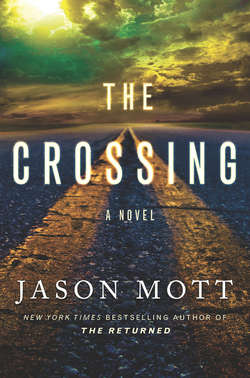Читать книгу The Crossing - Jason Mott, Jason Mott - Страница 19
Оглавление
To My Children,
Your mother always smiled more than I did and I never understood why. She planned trips we knew we weren’t going to take. She bought old photos at yard sales of people we didn’t know and she told me the fictitious narrative of their lives in her best storyteller’s voice. In the mornings she assigned me the most interesting horoscope she could find, regardless of what sign it fell under. We lived in a small apartment that she turned into a home. She filled it with items rooted in the both of us. The scarf she wore on our first date. A fistful of sand from a night shared on a beach. She always found a way to present these small things like holy relics so that we were never far away from the things we love.
By the end of the first month of knowing we were bringing a child into the world I couldn’t sleep. At night I sat up reading while your mother snored in that catlike way of hers. I reread old books, certain I had missed something important but never exactly sure what. When the morning came, I had slept for maybe two hours. My eyes stung and my body felt as though it belonged to someone else. Then your mother would roll over and kiss me—she was always touching, always trying to prove to me that we were connected—and my body would become my own once again.
At work, I wrote a personal interest column. “Keeping hope alive” is how Clarence, the old man who owned the paper, referred to it. It was my job, he felt, to stem the dismal tide that seemed to be rising. I was supposed to undo everything that was being done in the world.
Clarence—a stout man with wide shoulders, round glasses and an even rounder bald head—told me one day, “It’ll never matter more than it does right now.”
“What’s that?”
“It’s all knocking on the front door. And we’ve got to answer it, for better or worse. But that doesn’t mean we have to give up.”
“You lost me.”
“Like hell I did.”
Whenever possible, “Like hell I did” was how he ended conversations. There was nothing those four words couldn’t do. They made him enigmatic and wise when, only a moment ago, he had been just a fat old bald man with arthritic knuckles and a newspaper that was draining his life’s savings.
That night in bed, I told your mother about Clarence and what he’d said.
“I think he’s right,” she mumbled. It was early still but she was already half-asleep.
“Right about what?” I asked. “What he said didn’t make any sense.”
“Wise words coming your way,” she said, just as she fell asleep.
It was that morning’s horoscope.
It felt like everyone was talking about something but had forgotten to clue me in on the conversation.
Meanwhile, the world and the things that happened in it made my job a little harder every day. But still, I did my work, and each and every Sunday, Clarence’s newspaper came out with my byline and some story that made it seem as if everything in life made sense. And all the while insomnia was my friend and I felt like a fraud because there you were, growing, next to me in the bed inside your mother, and I was just perpetuating a lie. I was saying that everything was okay and that everything would continue to be okay. Parenting 101: The Art of Hopefulness.
Then one day, Clarence came in and canceled my column. “It’s all just getting too big,” he said.
“That’s no reason to cancel me,” I said. “I’ve got a kid on the way.”
“I know,” he said. “I didn’t say I was firing you. I’ll still find something for you to do. Sports maybe. Or crime. There’s enough of that to spread around.”
I didn’t want sports and I didn’t want crime. I wanted people. I wanted to write about the fair that had just arrived. I wanted to describe the way the lights lit up the sky until they reached the clouds. I wanted to talk about the laughter that could never drown out the familiar and strange music that seemed to rise up from everywhere at a fairground, sounding unlike anything else over the course of your life. I wanted to tell people about the Whirl-and-Twirl, the Teacup ride, the Rocking Ship and the Rocket Ship, the Bumper Cars, the cotton candy that promised heaven and diabetes at the same time. All of it mattered just then. It wasn’t hope anymore, it was doctrine. People needed to know it still existed just like they needed to know that there was someone who heard their prayers in the late hours of the night.
And that someone, in a certain type of way, was me. By writing it all down I was saving everything. Preserving the moments that can be easily forgotten. Saving them not for me. Not even for you. But for everyone.
Clarence published me only once a month after that. He added crime. He added sports. He added terrorism. He added politics. He poured it all on. Milk onto cereal. But once a month people got better news. They got to hear about that fair. And after it had come and gone, I wrote another piece on it, so that they would know that just because they couldn’t see it anymore didn’t mean it wasn’t still out there. Still alive. Still pouring light up into darkness.
We changed the title of my column to The Art of Hopefulness not long after that. It was your mother’s suggestion. “Hope,” she said, “is just imagination put into practice.” I couldn’t tell if it was my horoscope for the day or her own idea.
